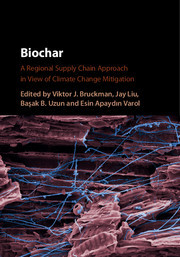Description
Biochar
A Regional Supply Chain Approach in View of Climate Change Mitigation
Coordinators: Bruckman Viktor J., Apaydın Varol Esin, Uzun Bașak B., Liu Jay
This state-of-the-art compendium, combining theory with practical examples, looks at the entire biochar supply chain.
Language: English
Subjects for Biochar:
Publication date: 11-2016
125 p. · 18x25.2 cm · Hardback
125 p. · 18x25.2 cm · Hardback
Description
/li>Contents
/li>Biography
/li>
Climate change poses a fundamental threat to humanity, and thus solutions for both mitigation and adaptation strategies are becoming increasingly necessary. Biochar can offer a range of environmental services, such as reclamation of degraded land, improvement of soil fertility and carbon sequestration. However, it also raises questions, regarding sustainable feedstock provision, biomass pyrolysis, and soil amendment. These questions, among various others, are addressed in this state-of-the-art compendium. Covering a broad geographical range, with regional assessments from North America, Europe, the Near East, and Southeast Asia, this interdisciplinary volume focuses on the entire biochar supply chain, from the availability and economics of biomass resources, to pyrolysis, and ultimately to the impacts on soil properties. The combination of theory with practical examples makes this a valuable book for researchers, policymakers, and graduate students alike, in fields such as soil science, sustainable development, climate change mitigation, biomass and bioenergy, forestry, and environmental engineering.
List of contributors; Preface; 1. Biochar in the view of climate change mitigation: the FOREBIOM experience Viktor J. Bruckman, Michaela Klinglmüller and Milutin Milenković; Part I. The Interdisciplinary Approach: 2. A supply chain approach to biochar systems Nathaniel M. Anderson, Richard D. Bergman and Deborah S. Page-Dumroese; 3. Life cycle analysis of biochar Richard D. Bergman, Hongmei Gu, Deborah S. Page-Dumroese and Nathaniel M. Anderson; 4. Systems integration in European forestry: drivers and strategies Saran P. Sohi; 5. Biochar as an integrated and decentralised environmental management tool in the Botanic Garden Berlin-Dahlem Robert Wagner, René Schatten, Kathrin Rößler, Ines Vogel and Konstantin Terytze; Part II. Sustainable Biomass Resources: 6. An Integrated approach to assess sustainable forest biomass potentials at country level Michael Englisch, Thomas Gschwantner, Thomas Ledermann and Klaus Katzensteiner; 7. Sustainable biomass potentials from coppice forests for pyrolysis: chances and limitations Valeriu-Norocel Nicolescu, Eduard Hochbichler and Viktor J. Bruckman; 8. Towards environmental and economic sustainability via biomass industry: the Malaysian case study Tang Kok Mun, Wan Asma Ibrahim and Wan Rashidah Kadir; 9. Carbon sequestration potential of forest biomass in Turkey Betül Uygur and Yusuf Serengil; Part III. Biochar Production (Pyrolysis): 10. Biochar production Frederik Ronsse; 11. Biomass pyrolysis for biochar production: kinetics, energetics and economics Byungho Song; 12. Pyrolysis: a sustainable way from biomass to biofuels and biochar Başak B. Uzun, Esin Apaydın-Varol and Ersan Pütün; 13. The role of biochar production for sustainable development in Thailand, Lao PDR and Cambodia Maliwan Haruthaithanasan, Orracha Sae-Tun, Natthaphol Lichaikul, Soktha Ma, Sithong Thongmanivong and Houngphet Chanthavong; Part IV. Biochar Application as a Soil Amendment: 14. Biochar applications to agricultural soils in temperate climate – more than carbon sequestration? Gerhard Soja, Elena Anders, Jannis Bücker, Sonja Feichtmair, Stefan Gunczy, Jasmin Karer, Barbara Kitzler, Michaela Klinglmüller, Stefanie Kloss, Maximilian Lauer, Volker Liedtke, Franziska Rempt, Andrea Watzinger, Bernhard Wimmer, Sophie Zechmeister-Boltenstern and Franz Zehetner; 15. Opportunities and uses of biochar on forest sites in North America Deborah S. Page-Dumroese, Mark D. Coleman and Sean C. Thomas; 16. The role of mycorrhizae and biochar on plant growth and soil quality Ibrahim Ortaş; 17. The use of stable isotopes in understanding the impact of biochar on the nitrogen cycle Rebecca Hood-Nowotny; 18. Biochar amendment experiments in Thailand: practical examples Thavivongse Sriburi and Saowanee Wijitkosum; Index.
Dr Viktor J. Bruckman is a postdoctoral researcher at the Commission for Interdisciplinary Ecological Studies, Austrian Academy of Sciences. He also leads the Sustainable Forest Biomass Network (SFBN) Task Force of the International Union of Forest Research Organizations (IUFRO). Dr Bruckman served as principal coordinator of the FOREBIOM project, looking at climate change mitigation potentials of biochar.
Professor Jay Liu is Head of Department and Leader of the Intelligent Systems Laboratory (ISL) at Pukyong National University, South Korea. He is actively involved in research on process systems engineering, with a focus on energy issues. ISL's research covers process design and simulation, and the application of chemometrics, particularly for BTL (biomass-to-liquid) processes.
Professor Başak B. Uzun (1975–2015) was a Professor in the Department of Chemical Engineering at Anadolu University, Turkey, and a member of the Carbon Materials Processing Group. Her research attempted to determine the effect of pyrolysis conditions on product yields and quality, using different types of pyrolysis reactors for bio-oil and biochar production.
Professor Esin Apaydın Varol is an Assistant Professor in the Department of Chemical Engineering at Anadolu University, Turkey. She is currently working on the utilization of biomass for energy and carbonaceous products, and her research interests include biomass composition, its thermal degradation, and product characterization via spectroscopic and chromatographic methods.
Professor Jay Liu is Head of Department and Leader of the Intelligent Systems Laboratory (ISL) at Pukyong National University, South Korea. He is actively involved in research on process systems engineering, with a focus on energy issues. ISL's research covers process design and simulation, and the application of chemometrics, particularly for BTL (biomass-to-liquid) processes.
Professor Başak B. Uzun (1975–2015) was a Professor in the Department of Chemical Engineering at Anadolu University, Turkey, and a member of the Carbon Materials Processing Group. Her research attempted to determine the effect of pyrolysis conditions on product yields and quality, using different types of pyrolysis reactors for bio-oil and biochar production.
Professor Esin Apaydın Varol is an Assistant Professor in the Department of Chemical Engineering at Anadolu University, Turkey. She is currently working on the utilization of biomass for energy and carbonaceous products, and her research interests include biomass composition, its thermal degradation, and product characterization via spectroscopic and chromatographic methods.
© 2024 LAVOISIER S.A.S.




